by Patsy Weiler
An afternoon in conversation with Eric Klumpe, an MTSU Physics and Astronomy professor and University Honors College faculty member, is like climbing into a spaceship and exploring the Milky Way. Fasten your seat belt. There’s much to discover about Klumpe, from the unusual pronunciation of his name (KLOOM-PA) to the fact he is an astronautical engineer.
Fit and soft-spoken with glasses, a thatch of silver hair, a dry sense of humor, and an ever-present curiosity for learning, he describes himself as your “basic geek,” which, in typical Klumpe laid-back style, is an understatement. Before arriving at MTSU in 1999, he worked for a dozen years at NASA’s Jet Propulsion Laboratory in Pasadena, California, where his efforts contributed to the Voyager spacecraft and Galileo Project—launched to explore Jupiter and its moons.
Most early mornings, Klumpe straps on a helmet and leisurely travels to campus on his Harley-Davidson—a motorcycle he has ridden over the Tail of the Dragon, a corkscrew stretch of mountain road near the Great Smoky Mountains featuring a dizzying 318 curves in 11 miles. He likes all kinds of music but has a weakness for “face-melting guitar solos. You know, the ones that you listen to while driving your car that tempt you to run a red light,” he said with a hearty laugh.
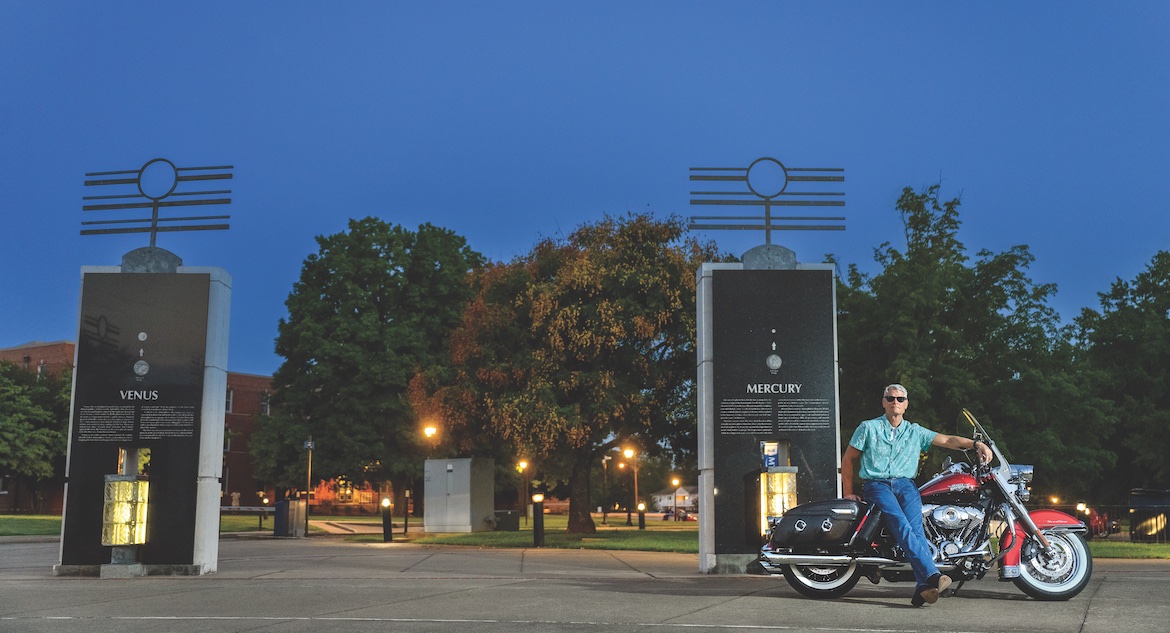
Eric Klumpe at the MTSU Uranidrome with his Harley-Davidson (Photo by J. Intintoli)
It is obvious Klumpe’s world revolves around his three grown children and wife of nearly 40 years, Dr. Marynelle Klumpe, a radiologist, who shares his enthusiasm for hiking, riding bicycles, backpacking, and reading.
“I love words,” Klumpe said. “My wife and I spend many hours every week reading to each other while enjoying morning coffee and sitting in two rocking chairs on our front porch.”
Recent reads have included Echoes of Eden by Jerram Barrs and Just Mercy by Bryan Stevenson. But his true passion, the activity that makes his face shine brighter than a full moon on a dark night, is being an educator—one who challenges his students to work hard and believe they can reach far beyond what they thought was possible in life.
“I want to change students’ lives for the better,” Klumpe said. “Students register for my classes because they are interested in learning more about the subjects of astronomy and physics. But I also want to help them to identify what their strengths, gifts, and talents are and to utilize and develop those skills to reach their educational goals. I also try to help students identify those things in their lives that either need improvement or hinder their performance.”
He worked for a dozen years at NASA’s Jet Propulsion Laboratory . . . where his efforts contributed to the Voyager spacecraft and Galileo Project.
FROM BLACK HOLE TO CALTECH
Klumpe is a man of deep faith, holds a Fellowship in the Royal Astronomical Society, and earned six academic degrees—four of which are advanced (three master’s degrees and his doctorate). He teaches an introductory Honors astronomy class to Buchanan Fellows—20 students who annually receive the best scholarship offered to anyone attending MTSU and named for alumnus James M. Buchanan (Class of 1940), a 1986 Nobel Prize winner in Economic Sciences.

Klumpe’s motorcycle vanity plate
“Dr. Klumpe has been teaching the introductory astronomy class to Buchanan Fellows since its inception, and it is common for students who entered the class wondering why they were there to say that it was one of the best classes they had taken,” Honors Dean John R. Vile said. “He has an amazing ability to connect with students.”
One of the surprising things these promising scholars learn about their professor is that after graduating from high school, he had basically fallen into a black hole with little hope of climbing out.
“I hated school,” Klumpe admitted. “I had an attitude and had boxed myself in with so low of a GPA that no four-year college would accept me.”
His life would be set on a trajectory of change when he accompanied a friend who was picking up admission information for Pasadena (California) City College. While waiting in an outer office area, Klumpe was approached by an admission counselor named John D. Reynolds, who encouraged him to just come in and talk a while, even though the tall, skinny teen had made it clear he had no interest in enrolling.
“I was just a smart aleck who was too cool for school,” Klumpe recalled.
Their time together struck a chord in Klumpe, who eventually asked the counselor to name the hardest degree to obtain. The answer: physics. Klumpe decided that was what he wanted to study.
“I had to take extra classes and summer school because I didn’t have the higher-level math classes in high school,” said Klumpe, who earned his associate degree and eventually went on to be accepted at the prestigious California Institute of Technology, popularly known as Caltech, where he completed a bachelor’s in Engineering and Applied Science.
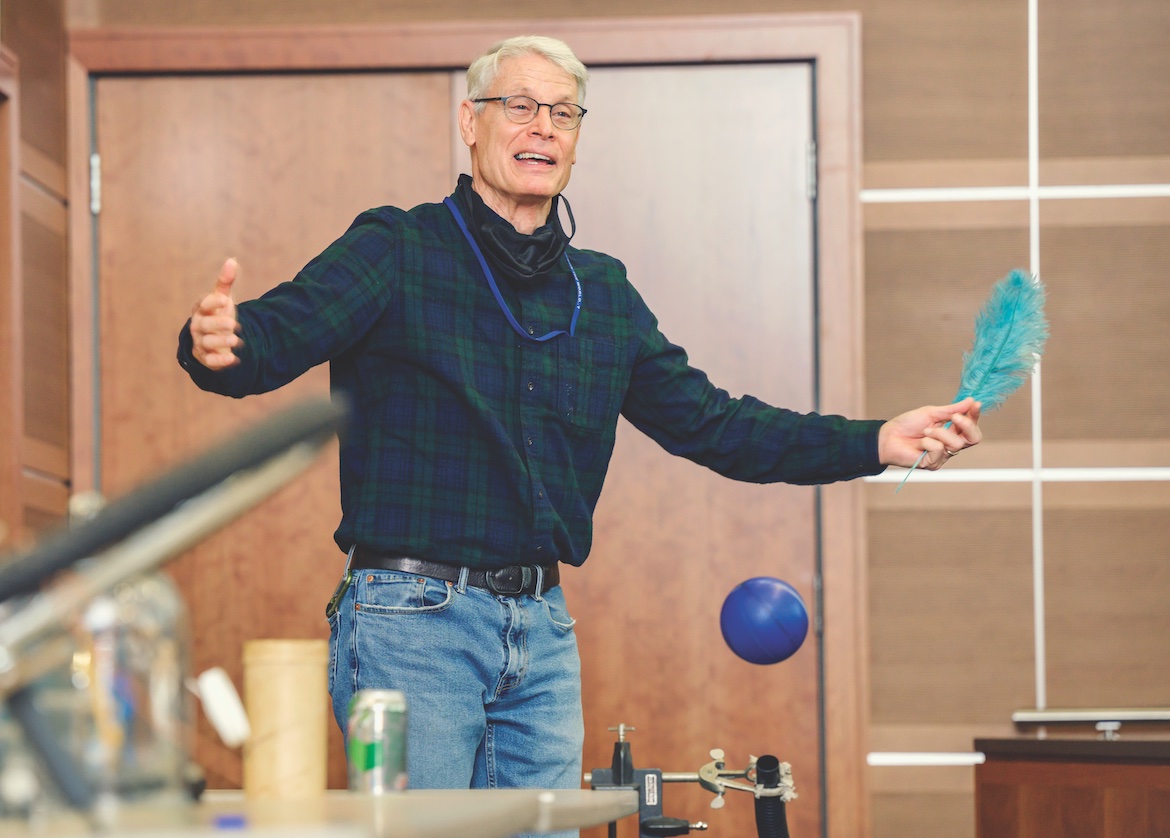
Klumpe performing experiments at the annual Presidents Day Honors College Open House
In his classroom, Klumpe focuses on teaching his students the value of hard work and opportunities higher education can provide them.
Harry Potter character “Kendra Dumbledore’s epitaph is from Matthew 6:21 in the Christian Bible. It reads, ‘Where your treasure is there your heart will be also,’ ” Klumpe said. “I want my students to treasure the opportunity given them within the classrooms at MTSU. Anything worth doing well will usually require hard work—generally, harder work than you initially expected. Usually, freshmen are knowledge consumers. I want them to transition into knowledge creators before they graduate.”
Now on campus for almost 25 years, Klumpe is a strong advocate of MTSU and the Honors College.
“MTSU does many great things for the community,” he said. “There are numerous diverse educational opportunities here, and the University has done much to prepare thousands of students for the subsequent phases of their lives.
“The Honors College is one more facet of opportunity available to a student who chooses MTSU. Not every runner has to enter and complete a marathon. It takes commitment and discipline to finish the race, just like being a part of the Honors College,” Klumpe continued. “The student who is up to the rigor and academic challenge of the Honors College will be stretched and strengthened. The Honors College is what I would have wanted when I was in college and something I want to contribute to for the students at MTSU.”
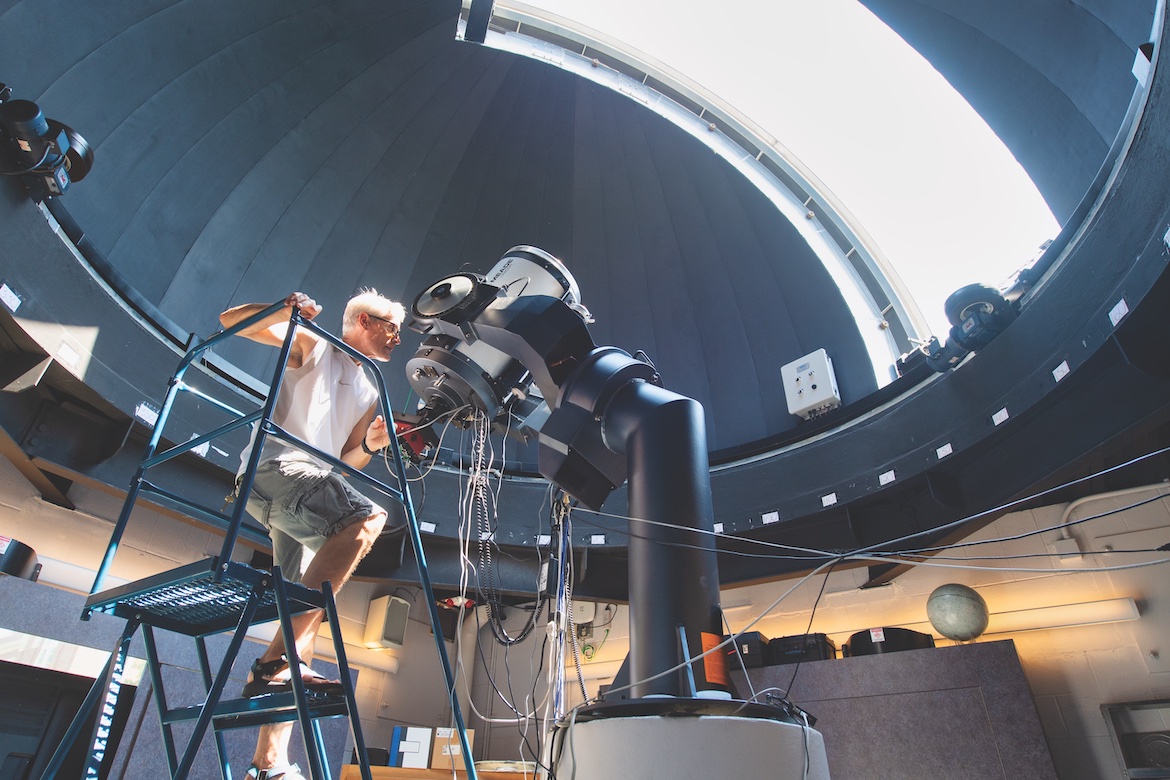
Klumpe monitoring the telescope providing the campus broadcast of the 2017 eclipse
Bassam Aboona (Class of 2018) came to MTSU to study Physics as a Transfer Fellow, the highest academic award given to transfer students at MTSU through the Honors College. After earning a bachelor’s in Professional Physics, he is now a graduate student at Texas A&M, working at the university’s Cyclotron Institute, and plans to complete his doctorate in 2023.
“I met Dr. Klumpe in theoretical physics,” Aboona said. “It was a challenging course, but he was always there to help. He strived to connect abstract mathematical concepts to real-world experiences, utilizing examples from his previous careers. He was organized, accessible, and took great care in answering my questions. He became a primary professor for internship advice and was very proactive in writing personalized recommendation letters. I have adopted many organizational skills from him and learned how being patient and providing help to others can lead to great outcomes.”
A GALAXY OF FUN
Beyond the classroom, Klumpe contributes to the Honors College in a variety of other ways. He often serves as a thesis advisor for Honors students, has given several Honors lectures on contemporary discoveries, presents a physics “magic show” demonstration as part of the college’s Presidents Day Open House event that is enjoyed by attendees, and serves on the Buchanan Fellows Selection Committee every other year. He and his wife also host the freshman Buchanan Fellows at their home three times a year.
Brianna Bauman (’20, ’21), now a vital issues engineer at the Nissan Field Quality Center in Smyrna, has fond memories of the impact Klumpe had on her time as a Buchanan Fellow. She earned her bachelor’s in Mechatronics Engineering, with an emphasis in robotics and automation engineering, and her M.S. in Professional Science with an Engineering Management concentration.
“Dr. Klumpe is a wonderful professor,” Bauman said. “I was in his Buchanan astronomy class my freshman year and had such a great experience that I later chose him as my thesis advisor. He truly cares about his students and loves to see them succeed. His class incorporates fun activities, and he is always available for help.
“He also plans several great events for his Buchanan students. Dr. Klumpe is one of the most kind, supportive, genuine people and one of the best professors.”
Klumpe says he invites the Buchanan Fellows to his home to build relationships, with time to relax and learn about one another. Activities include everything from eating pizza and watching the Galaxy Quest movie to playing Hallmark Christmas Movie Bingo.
“The dinner table is an amazing place. Students are all different because they came from different high schools. But we all have a common thread because of the Buchanan Fellowship,” Klumpe said. “We have a table full of tasty food, and it is amazing to me how sharing a meal with others breaks down barriers. A classroom has a dominant voice. The dinner table is filled with many voices and laughter. We can talk about ‘life’ and not just astronomy.
“I hope my students can see me as a person who cares and is an astronomer, an academic, a husband, a dad, a guy who is socially awkward, and someone who has made his fair share of mistakes in life.”
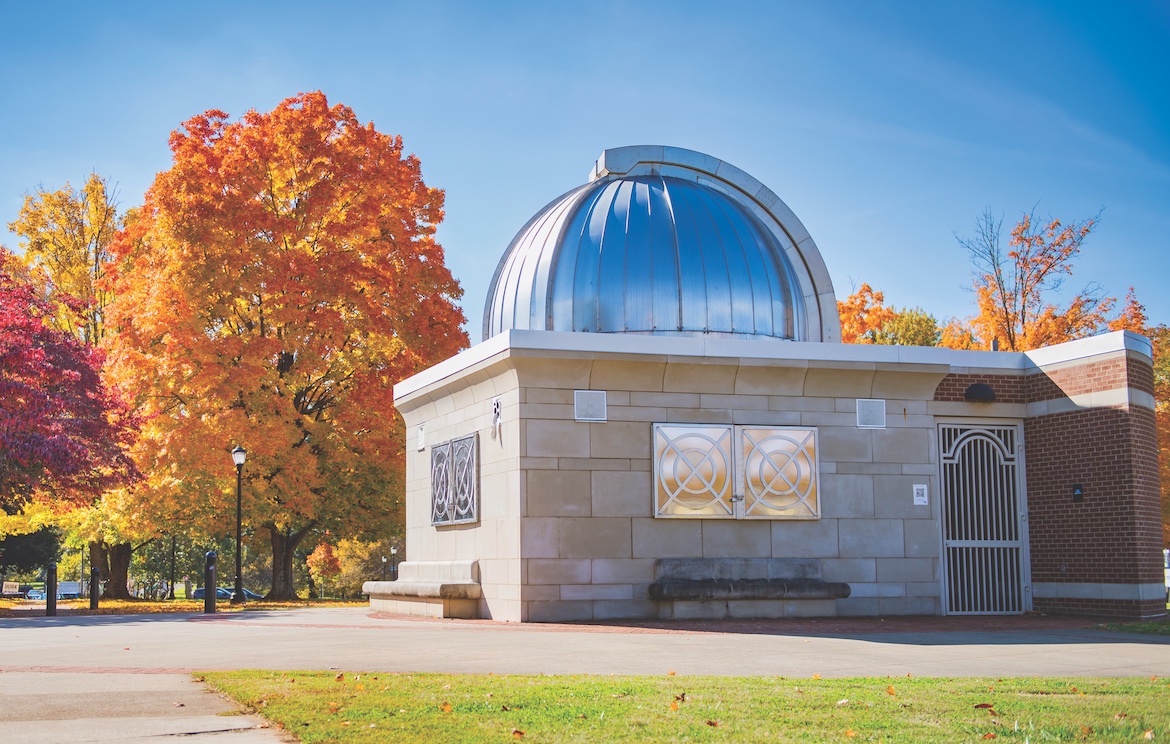
MTSU’s telescope and observatory
As director of MTSU Observatories, Klumpe oversaw the design and construction in the early 2000s of MTSU’s Uranidrome, a hands-on, self-guided naked-eye observatory used to teach astronomy and geometry. It sits on a plaza near the campus telescope.
“The complex provides hands-on learning in both a modern context (the telescope) and an ancient context (the Uranidrome),” he said. “The Uranidrome puts my students in the shoes of people who did astronomy 2,000 years ago. It can elevate our respect for other cultures that existed a long time ago.”
An advocate of community outreach, Klumpe and Chuck Higgins, his fellow Physics and Astronomy professor, organize the free First Friday Star Parties at MTSU annually. The public is invited to attend a short talk in Wiser-Patten Science Hall and, weather permitting, visit the observatory afterward.
Klumpe says he has learned a great deal traveling through different galaxies of life and likes nothing better than sharing his knowledge, inspiring his students to grasp the infinite possibilities of their own next frontiers.
FIRST FRIDAY STAR PARTIES
First Friday Star Parties are a community outreach during the fall and spring semesters—and they’re free to MTSU students, faculty, and the public.
Physics and Astronomy faculty bring 45–60 minutes of lively, interesting topics in Wiser-Patten Science Hall Room 102. Weather permitting, they are followed by telescope viewing at the observatory. Topics range from current events to comets, planets, stars, constellations, black holes, and more.
More info:
MTSU Observatory: mtsu.edu/observatory
First Friday Star Parties: mtsu.edu/physics/star-party.php

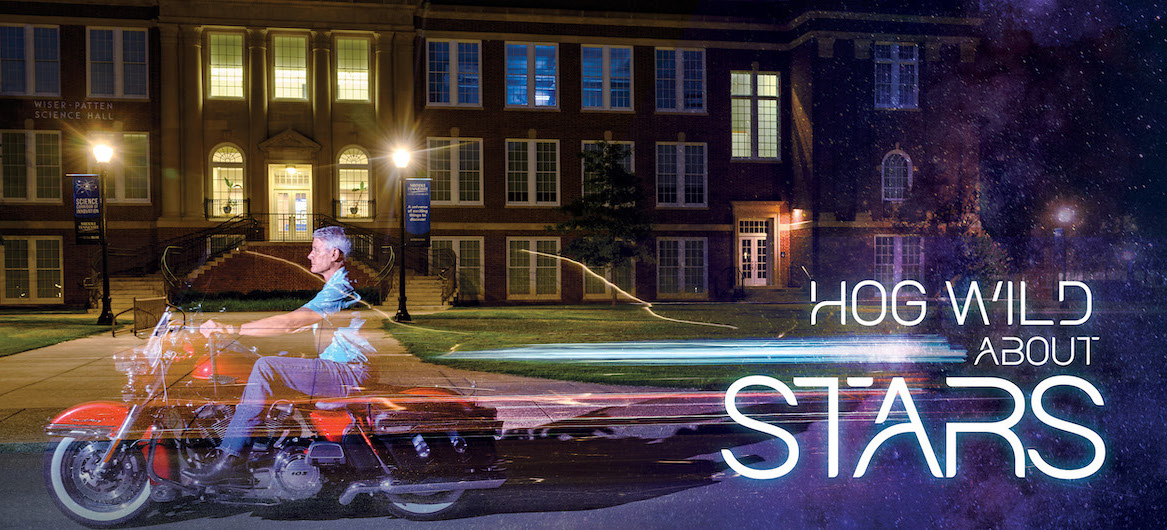
COMMENTS ARE OFF THIS POST